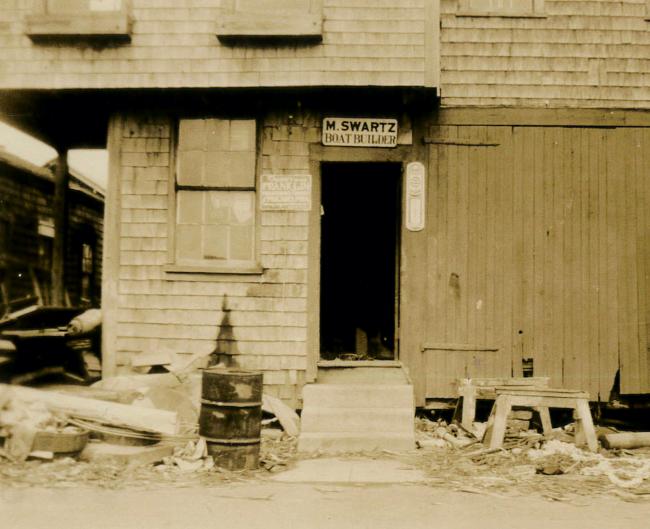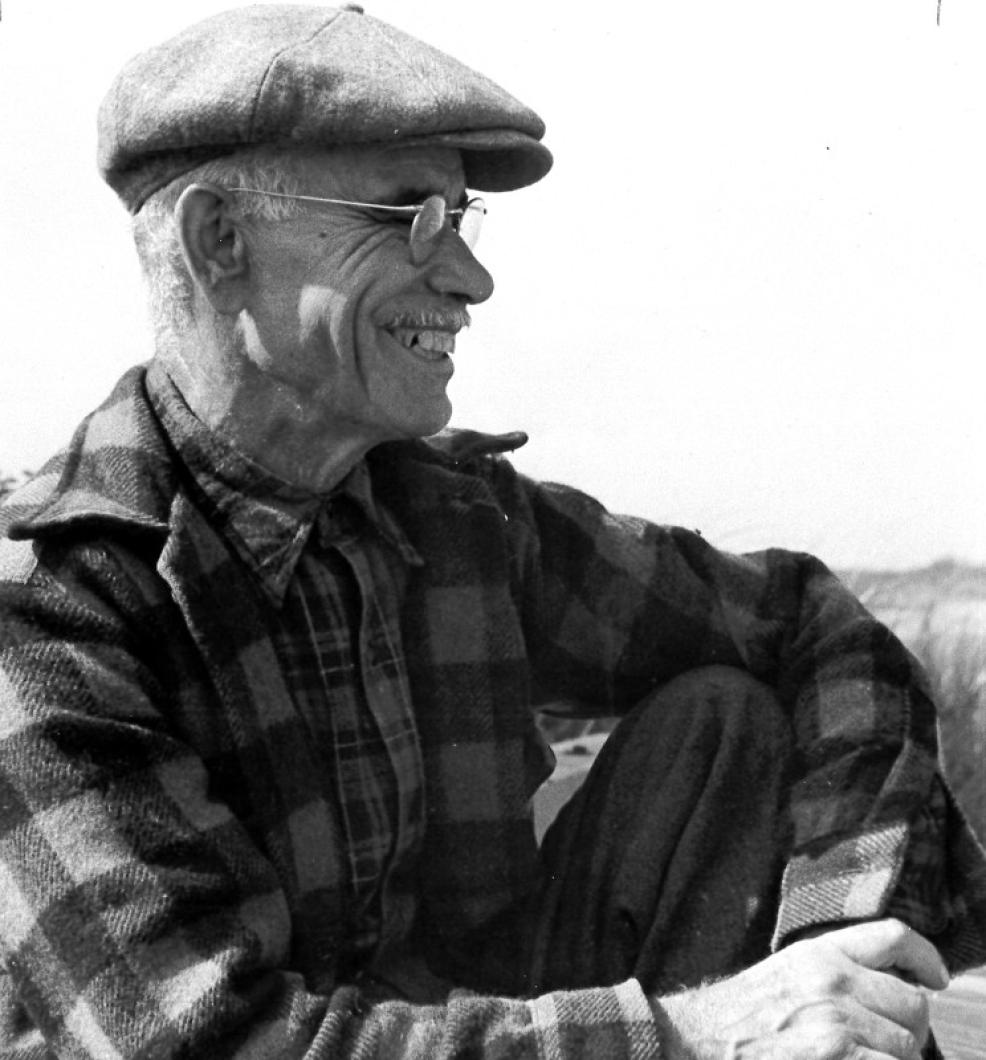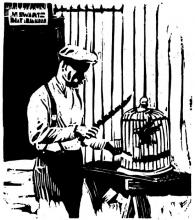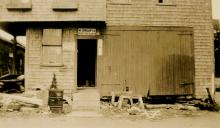Manuel Swartz Roberts, one of the best known and best loved figures of Martha’s Vineyard, died at 6 o’clock this morning after a prolonged period of failing health. As boat-builder, craftsman, philosopher, and most of all as a wise and warmly humorous friend, he had become a legend in his own time.
Everyone who knew Edgartown knew Manuel. Several generations of summer visitors knew his shop in childhood and never forgot the look of its efficient disorder, the smell of its shavings, and the atmosphere of its salty things. Anyone who wanted to know something about boats or the salt water around Edgartown would ask Manuel, and Manuel gave freely of his information and his friendship.
His skill was proverbial, and so was his ingenuity. His boats were famous, and each seemed marked by his individuality.
Manuel was 82. He was the son of Joseph and Mary Louise Roberts. In earlier years he had worked as a carpenter for William G. Manter and for other contractors, and he helped build some of the largest summer homes of Edgartown. Most of his life was spent in Edgartown, but he had also worked in a mill in the Carolinas as a young man.
Surpassed Old Tradition
The major part of his career was as a boat-builder in the unforgettable structure now known as the Old Sculpin gallery. He knew, in his time, all the able craftsmen of Edgartown, and he carried on and surpassed the old tradition.
He was a past master of Oriental Lodge, A.M. & F. M., and a member of the Royal Arch Chapter. For years he was a member of the Edgartown fire department and one of the engineers.
He is survived by his wife, Mrs. Ethel Roberts; a son, Charles; and stepdaughters, Mrs. Elisha Smith of Edgartown and Mrs. Al Saniuta of Arlington, N. J. There are also nieces and nephews.
A close friend of many years, Joseph Chase Allen, writes of him as follows:
He was best known throughout his active career as Manuel Swartz, using the family name of Roberts only through the latter years of his life. It has been noticeable, however, that his Portuguese friends never pronounced the Swartz as others did, but called it “Swas”. This latter pronunciation was the proper one, yet it was a middle name. His father was Joseph Roberto, as nearly as the Portuguese name can be spelled, and he was influenced by his friends in Edgartown to anglicize it to Roberts, which he did by legal process.
Manuel, his son, developed into a village factotum as truly as the famed barber of Seville, for it is true that for half a century old and young flocked to the door of his shop to present their problems of various kinds. Not only those which required mechanical skill in the solving, but personal and family troubles, and Manuel applied his skill and his calm, philosophical knowledge as the case may have required, with an unvarying success.
For such was the man. He was a son of Azorean Portuguese, of the old fashioned variety who were the salt of the earth, and he grew to manhood among Island Yankees, whose code of principles was no less rigid. Islanders all together, they reared among them an Islander who became outstanding for his skill and deep sense of honor.
He was an artist, with the perception of the ancients who could se-e the image that they sought to create in the _rough black of stone, and Manuel could see the same in the log, freshly cut from the woods, and as he worked, it was clear that he merely removed the superfluous material from around that image, which ‘was concealed from all other eyes than his own.
Upright, honorable and generous always, his Word was accepted by all who knew him and his workmanship was never questioned.
Specialized Vocabulary
Born and reared beside the sea, a boat builder for a half a century, with his closest associates sailors and fishermen, his vocabulary was that of the seafarer, his viewpoint adjusted according to winds and weather, and his entire nature one with the elements which raged or smiled about him. To enter Manuel’s shop and listen to the conversation between him and his older associates was to overhear phraseology which was foreign to the average person, spiced as it was with longshore and deep sea terms. Such commonplace expressions as “allowance” in rough-shaping a piece of lumber, became “leeway” among these men, and the finely-calculated trimming of the nearly completed article required, “running close-hauled”, or “pinching into the wind”, all indicating exactness. With Manuel’s passing, much of this truly Island colloquialism must disappear, for he was almost the last of the ancients, reared, as they said, “in sail”.
He had inherited all this, together with the knack and knowledge of the craftsmen of another and older age, who were forced during their own active years, to invent or contrive tools and formulas by which to accomplish the many tasks which confronted them. The craftsman of today can purchase factory-made tools for such purposes, but Manuel had learned in youth to make his own before such things were manufactured, and the accuracy and beauty of the articles which he made constituted a testimonial to the soundness and excellence of such ancient methods.
His boats were admired and praised by the most famous of builders of this general area. His furniture was the exact copy in design and finish of that produced by ancient artists, and such things of wood grew under his hands as a picture grows beneath the brush of the painter.
Another of Manuel’s friends has this recollection:
Of a Vanished Era
A man of unusual charm, Manuel drew people from every walk of life. He and his shop were the center of waterfront attraction for many, many years. There never was before and never again will be such a place - a spot with an era forever gone. All gathered to hear; he had his own lore and that of older times, methods and people.
His models are the prized possessions of many a home, and at least one is in the Smithsonian Institution. The late William B. Dinsmore Sr. spent many hours on his knees, with Manuel working on the pattern of one of his many catboats. And once when Manuel went on a Cape trip with the late Fred Guild, they called at the Crosby yards. It was Manuel’s first trip there, and he later recalled, modestly but with delight, that the late Manley Crosby said: “Manuel, you build better cat boats than we.”
The funeral will be conducted by Rev. S. Reed Chatterton at the Edgartown Federated Church on Sunday at 2 p.m., and burial will be at Westside Cemetery in Edgartown.
The Masonic service will be held Saturday night at the Martha’s Vineyard Funeral Home in Vineyard Haven, with the officers of Oriental Lodge officiating.











Comments